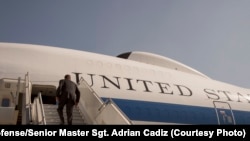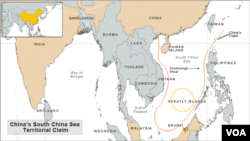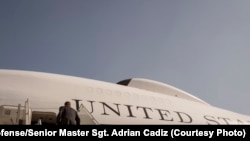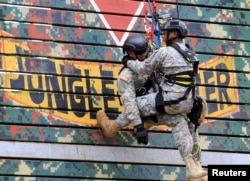U.S. Secretary of Defense Ash Carter is in Manila amid tensions between the Philippines and China over Chinese militarization of features in the South China Sea.
Carter’s arrival Wednesday follows approval by the Philippines’ Supreme Court of a new agreement between Washington and Manila to allow U.S. rotational military forces on Filipino bases spread across the archipelago.
“I wanted to come here as soon as possible after that to signify the importance of that to us and the alliance,” Carter told reporters en route to Manila Wednesday.
Carter will visit Antonio Batista Air Base during his visit, one of at least five bases where U.S. troops will be stationed.
The base is located just 160 kilometers from the disputed Spratly Islands, a group of islands, reefs and cays claimed by China, the Philippines, Malaysia and others.
In the last two years, China has created some 1,200 hectares of artificial islands atop reefs in the Spratlys.
A Chinese civilian airplane made a test landing on a runway on the Spratly Island’s Fiery Cross Reef in January.
Satellite imagery by ImageSat International (ISI) has showed Chinese Shenyang J-11 fighter jets on Woody Island in the Paracel island group, causing concern that China might send military jets to the Spratly islands next.
Enhance military's ability
A senior U.S. defense official said the new U.S.-Philippines agreement will enhance the military’s ability to “operate in the region over the South China Sea” and “will strengthen our deterrent message as well.”
“We think that a peaceful and lawful approach to competing maritime claims is the way to go," Carter said.
PHOTO GALLERY: Carter's tour of Asia
One approach welcomed by Washington has been a Philippine case filed with an international court questioning the legality of what it calls China’s “excessive claims” in the sea. China rejects arbitration and is not participating in the case. A decision is expected in the next few months.
The U.S. opposes any change to the status quo in the South China Sea, and Carter said China was “by far” the country that has most aggressively reclaimed land and militarized features there.
James Clad, a former deputy assistant secretary of defense for Asia and a senior advisor for the Center for Naval Analysis, told VOA the U.S. needs to accept that China’s actions are “a frontal challenge” to the U.S. position in the western Pacific.
“We want to engage with the Chinese, but on the other hand we have to prepare for bad behavior,” Clad said. “The bad behavior has arrived, right?”
Maritime Security Initiative
Carter will also speak with Filipino leaders about the first installment of U.S. funding that was approved under a Maritime Security Initiative announced last year.
The five-year, $425 million program is aimed at assisting Southeast Asian nations in improving their naval and coast guard capabilities.
“Most of that money in the first initial year of it is going to the Philippines, and it will help them to do their part in our joint activities in the area of maritime security,” Carter said.
About 80 percent of the $50 million allotted for 2016 is going to the Philippines, according to a senior defense official.
“This will be an important boost for Philippine maritime domain awareness and their ability to see what’s happening out there past their coasts,” the defense official said.
Carter’s visit to the Philippines comes as about 8,500 U.S. and Filipino troops, along with a small contingent of Australians, are staging military drills called Balikatan, or “shoulder to shoulder.” However, officials have said the annual exercises are not aimed at any one country.
The defense secretary is expected to attend the closing ceremonies this week.







